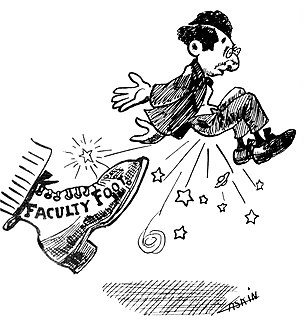Labour law mediates the relationship between workers, employing entities, trade unions and the government. Collective labour law relates to the tripartite relationship between employee, employer and union. Individual labour law concerns employees' rights at work also through the contract for work. Employment standards are social norms for the minimum socially acceptable conditions under which employees or contractors are allowed to work. Government agencies enforce labour law.

A non-disclosure agreement (NDA), also known as a confidentiality agreement (CA), confidential disclosure agreement (CDA), proprietary information agreement (PIA) or secrecy agreement (SA), is a legal contract between at least two parties that outlines confidential material, knowledge, or information that the parties wish to share with one another for certain purposes, but wish to restrict access to. Doctor–patient confidentiality, attorney–client privilege, priest–penitent privilege, bank–client confidentiality, and Kickback agreements are examples, often not enshrined in a written contract between the parties.
In the copyright law of the United States, a work made for hire is a work subject to copyright that is created by an employee as part of his or her job, or some limited types of works for which all parties agree in writing to the WFH designation. Work for hire is a statutorily defined term, so a work for hire is not created merely because parties to an agreement state that the work is a work for hire. It is an exception to the general rule that the person who actually creates a work is the legally recognized author of that work. According to copyright law in the United States and certain other copyright jurisdictions, if a work is "made for hire", the employer—not the employee—is considered the legal author. In some countries, this is known as corporate authorship. The entity serving as an employer may be a corporation or other legal entity, an organization, or an individual.
Employment is a relationship between two parties, usually based on a contract where work is paid for, where one party, which may be a corporation, for profit, not-for-profit organization, co-operative or other entity is the employer and the other is the employee. Employees work in return for payment, which may be in the form of an hourly wage, by piecework or an annual salary, depending on the type of work an employee does or which sector they are working in. Employees in some fields or sectors may receive gratuities, bonus payment or stock options. In some types of employment, employees may receive benefits in addition to payment. Benefits can include health insurance, housing, disability insurance or use of a gym. Employment is typically governed by employment laws, organisation or legal contracts.

United Kingdom labour law regulates the relations between workers, employers and trade unions. People at work in the UK benefit from a minimum charter of employment rights, which are found in various Acts, Regulations, common law and equity. This includes the right to a minimum wage of £8.21 for over 25-year-olds under the National Minimum Wage Act 1998. The Working Time Regulations 1998 give the right to 28 days paid holidays, breaks from work, and attempts to limit excessively long working hours. The Employment Rights Act 1996 gives the right to leave for child care, and the right to request flexible working patterns. The Pensions Act 2008 gives the right to be automatically enrolled in a basic occupational pension, whose funds must be protected according to the Pensions Act 1995.
In employment law, constructive dismissal, also called constructive discharge or constructive termination, occurs when an employee resigns as a result of the employer creating a hostile work environment. Since the resignation was not truly voluntary, it is, in effect, a termination. For example, when an employer places extraordinary and unreasonable work demands on an employee to obtain their resignation, this can constitute a constructive dismissal.
At-will employment is a term used in U.S. labor law for contractual relationships in which an employee can be dismissed by an employer for any reason, and without warning, as long as the reason is not illegal. When an employee is acknowledged as being hired "at will," courts deny the employee any claim for loss resulting from the dismissal. The rule is justified by its proponents on the basis that an employee may be similarly entitled to leave his or her job without reason or warning. The practice is seen as unjust by those who view the employment relationship as characterized by inequality of bargaining power.
An independent contractor is a person, business, or corporation that provides goods or services under a written contract or a verbal agreement. Unlike employees, independent contractors do not work regularly for an employer but work as required, when they may be subject to law of agency. Independent contractors are usually paid on a freelance basis. Contractors often work through a limited company or franchise, which they themselves own, or may work through an umbrella company.

Dismissal is the termination of employment by an employer against the will of the employee. Though such a decision can be made by an employer for a variety of reasons, ranging from an economic downturn to performance-related problems on the part of the employee, being fired has a strong stigma in some cultures.
A psychological contract, a concept developed in contemporary research by organizational scholar Denise Rousseau, represents the mutual beliefs, perceptions and informal obligations between an employer and an employee. It sets the dynamics for the relationship and defines the detailed practicality of the work to be done. It is distinguishable from the formal written contract of employment which, for the most part, only identifies mutual duties and responsibilities in a generalized form.
An employment contract or contract of employment is a kind of contract used in labour law to attribute rights and responsibilities between parties to a bargain. The contract is between an "employee" and an "employer". It has arisen out of the old master-servant law, used before the 20th century. But generally, the contract of employment denotes a relationship of economic dependence and social subordination. In the words of the controversial labour lawyer Sir Otto Kahn-Freund,
"the relation between an employer and an isolated employee or worker is typically a relation between a bearer of power and one who is not a bearer of power. In its inception it is an act of submission, in its operation it is a condition of subordination, however much the submission and the subordination may be concealed by the indispensable figment of the legal mind known as the 'contract of employment'. The main object of labour law has been, and... will always be a countervailing force to counteract the inequality of bargaining power which is inherent and must be inherent in the employment relationship."
Vicarious liability is a form of a strict, secondary liability that arises under the common law doctrine of agency, respondeat superior, the responsibility of the superior for the acts of their subordinate or, in a broader sense, the responsibility of any third party that had the "right, ability or duty to control" the activities of a violator. It can be distinguished from contributory liability, another form of secondary liability, which is rooted in the tort theory of enterprise liability because, unlike contributory infringement, knowledge is not an element of vicarious liability. The law has developed the view that some relationships by their nature require the person who engages others to accept responsibility for the wrongdoing of those others. The most important such relationship for practical purposes is that of employer and employee.
A permatemp is a temporary employee who works for an extended period for a single staffing client. The word is a portmanteau of the words permanent and temporary.

In contract law, a non-compete clause, or covenant not to compete (CNC), is a clause under which one party agrees not to enter into or start a similar profession or trade in competition against another party. Some courts refer to these as "restrictive covenants". As a contract provision, a CNC is bound by traditional contract requirements including the consideration doctrine.

The New Zealand Employment Relations Act 2000 is a statute of the Parliament of New Zealand. It was substantially amended by the Employment Relations Amendment Act 2001 and by the ERAA 2004.
Employee exit management or offboarding describes the consciously designed separation process when an employee leaves the company, for which they have previously worked within the scope of a work or service contract. It deals with the formal processes revolving around an employee's exit from an organization either through voluntary resignation, layoffs or termination.
A grievance is a formal complaint that is raised by an employee towards an employer within the workplace. There are many reasons as to why a grievance can be raised, and also many ways to go about dealing with such a scenario. Reasons for filing a grievance in the workplace can be as a result of, but not limited to, a breach of the terms and conditions of an employment contract, raises and promotions, or lack thereof, as well as harassment and employment discrimination.
Workplace relationships are unique interpersonal relationships with important implications for the individuals in those relationships, and the organizations in which the relationships exist and develop.
South African labour law regulates the relationship between employers, employees and trade unions in the Republic of South Africa.
In law, wrongful dismissal, also called wrongful termination or wrongful discharge, is a situation in which an employee's contract of employment has been terminated by the employer, where the termination breaches one or more terms of the contract of employment, or a statute provision or rule in employment law. Laws governing wrongful dismissal vary according to the terms of the employment contract, as well as under the laws and public policies of the jurisdiction.




